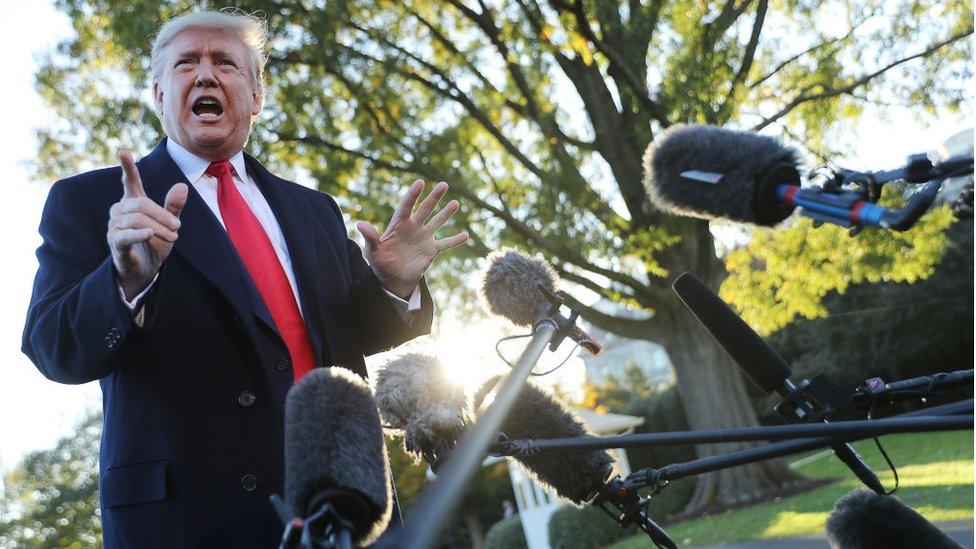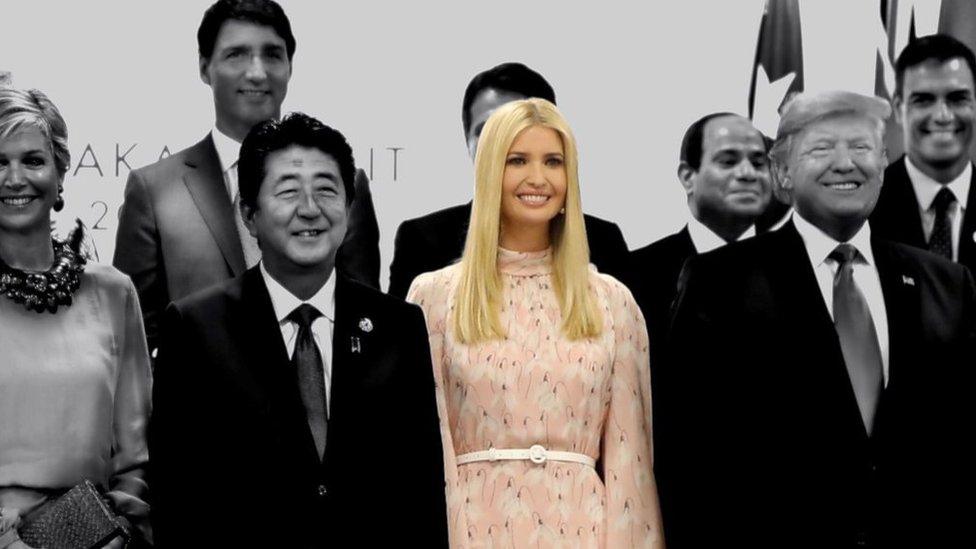Trump wants whistleblower named despite 'physical danger'
- Published

US President Donald Trump has called for the whistleblower who triggered the impeachment inquiry to be unmasked, ignoring a cease-and-desist warning.
On Thursday a lawyer for a whistleblower told the White House that Mr Trump's rhetoric was placing his client and family in physical danger.
Undeterred by the letter, Mr Trump renewed his attacks on the whistleblower and lawyer on Friday.
The individual's identity has so far been fiercely guarded by Democrats.
In August the whistleblower filed a report that eventually triggered impeachment proceeding against Mr Trump.
The report expressed concern over a phone call a month earlier in which Mr Trump asked his Ukrainian counterpart Volodymyr Zelensky to investigate Joe Biden, a Democratic front-runner for the 2020 US presidential election.
In Thursday's letter, sent to White House counsel Pat Cipollone, the whistleblower's lawyer Andrew Bakaj cites many examples of the president's "fixation" on the identity of his client in his comments to the media, at rallies and on Twitter.
"Such statements seek to intimidate my client - and they have," Mr Bakaj writes.
He continued: "Should any harm befall any suspected named whistleblower or their family, the blame will rest squarely with your client."
Whistleblower 'a disgrace' - Trump
But the next day, Mr Trump launched a fresh attack at the White House.
"The whistleblower is a disgrace to our country... and the whistleblower because of that should be revealed," he told reporters.
"And his lawyer who said the worst things possible two years ago, he should be sued, and maybe for treason."
Mr Trump may have been referring to the whistleblower's other lawyer, Mark Zaid, who has been under fire from the president's allies over tweet posted in 2017 in which he vowed - among other things - to "get rid of him [Mr Trump]".
Meanwhile, the president's daughter, Ivanka Trump, said in an interview with the Associated Press news agency that she did not believe the whistleblower's identity was "particularly relevant".
Trump impeachment: What you might have missed
"The whistleblower shouldn't be a substantive part of the conversation," she said, adding that the person "did not have firsthand information".
She echoed her father's view that the impeachment investigation was about "overturning the results of the 2016 election".
What's the background to this?
Democrats have said the whistleblower's identity is immaterial. They argue that the complaint, which alleges abuse of power by Mr Trump, has been substantiated by witness testimony to the impeachment committees.
The Democratic-controlled House of Representatives will next week hold televised hearings for the first time in this inquiry.
If the House eventually votes to impeach Mr Trump, the Republican-controlled Senate will hold a trial of the president.
If Mr Trump is convicted - which is widely viewed at present as unlikely - he would be removed from office.
But Senator Josh Hawley, a Republican, said on Thursday that he wanted to know the identity of the whistleblower if there was an impeachment trial.
He also said the president's team should be able to question the anonymous official.
"How else are we going to evaluate the content and the truthfulness of these people if we don't know who they are?" Mr Hawley told Missouri radio station KFTK.
What is the latest on the impeachment front?
Also on Friday, transcripts of testimony from White House National Security Council (NSC) experts Fiona Hill and Lt Col Alexander Vindman revealed new claims about acting White House Chief of Staff Mick Mulvaney.
The closed-door depositions last month showed that both officials said Mr Mulvaney had played a key role in co-ordinating a reported exchange of favours, under which Ukraine would announce an inquiry into the Bidens in exchange for the release of congressionally approved military aid.
Ms Hill, the White House's top Russia expert, quoted her former boss on the NSC John Bolton as saying that he wanted no part of the "drug deal" being arranged by Mr Mulvaney and other Trump appointees.
Lt Col Vindman, the NSC's top Ukraine expert and Army veteran told the House committees that Mr Mulvaney had "co-ordinated" a plan to condition a White House meeting with Mr Trump in exchange for an investigation into the Biden family.
Mr Mulvaney was ordered by Congress to testify behind closed doors on Friday, but refused, citing an "absolute immunity".

- Published2 July 2019
